As a devoted pet parent, you want the best for your cat. You might wonder if smoked salmon is safe for them. This guide will look into whether cats can eat smoked salmon, its benefits, risks, and how to add it to their diet.
Key Takeaways
- Salmon is a great source of Omega-3 fatty acids, which are essential for feline eye and heart health.
- Cats should only consume salmon as an occasional treat, making up no more than 10% of their daily calorie intake.
- Avoid feeding raw or smoked salmon to your cat due to the risk of bacterial infections and high sodium content.
- Cooked salmon, served in moderation, can provide beneficial nutrients for your cat’s skin, coat, and brain function.
- Canned salmon should be fed sparingly due to its high sodium content, which can be harmful to cats.
Table of Contents
You can begin by watching this helpful video from TheEncycloChannel.
Understanding the Relationship Between Cats and Salmon
Cats love the smell and high protein of salmon. This fits their natural diet as meat-eaters. Salmon’s nutrients, like amino acids, match what cats need to stay healthy.
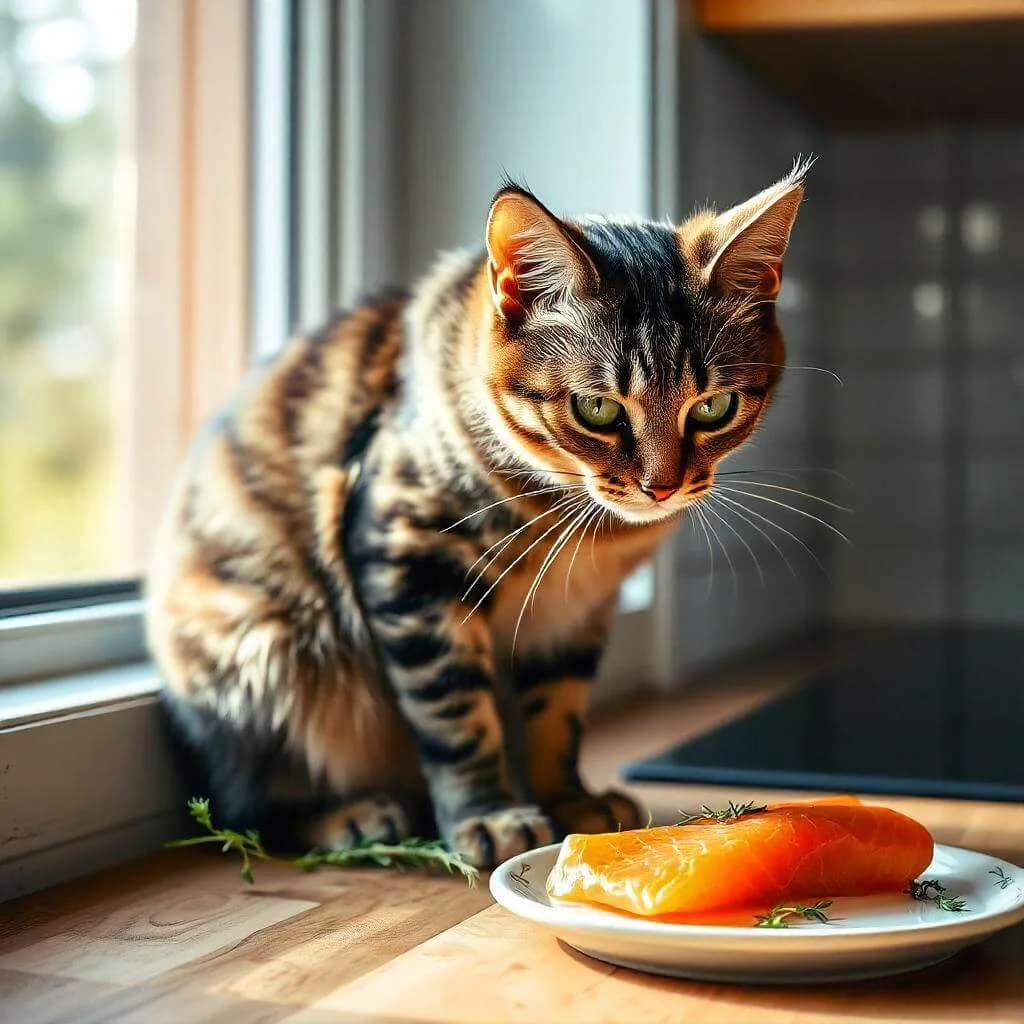
Why Cats Are Attracted to Salmon
The smell of salmon is very appealing to cats. They have a great sense of smell. This smell, along with salmon’s protein, makes it a favorite food for cats.
Cats’ cat food preferences and feline dietary habits are shaped by their love for fish. This natural attraction drives their instinct to hunt and eat meat.
The Natural Carnivorous Instinct
- Cats need a diet full of animal proteins to live well.
- Salmon’s protein meets cats’ dietary needs, giving them the nutrients they need.
- Cats are built to hunt and eat meat, making seafood like salmon very appealing.
Knowing how cats are drawn to salmon helps pet owners choose the right food. They can add salmon to their cat’s diet carefully, watching portion sizes and how it’s prepared.
The Nutritional Benefits of Salmon for Cats
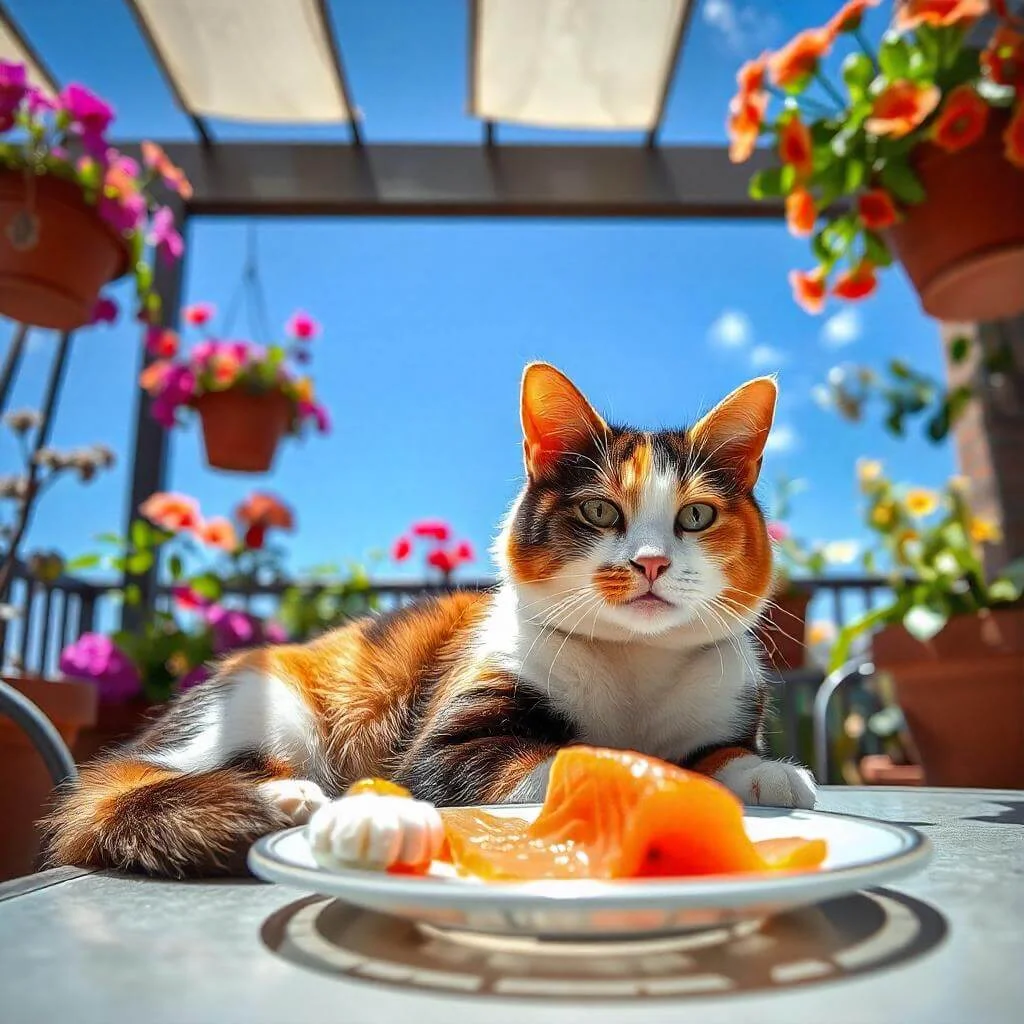
Salmon is a nutritional powerhouse for cats. It’s packed with Omega-3 fatty acids, which are vital for your cat’s health. These fats help with eye health, skin, and coat condition. They also support joint function and brain cognition.
Salmon is also a great source of protein for cats. Protein is key for a balanced diet, helping with muscle growth and immune strength. It also boosts your cat’s nervous system, energy, and metabolism thanks to vitamin B12 and B6.
| Nutritional Benefit | How Salmon Helps |
|---|---|
| Omega-3 Fatty Acids | Promotes healthy skin, coat, and eye function |
| Protein | Supports muscle development and immune health |
| Vitamin B12 and B6 | Enhances nervous system, energy, and metabolism |
| Joint Health | Reduces inflammation and supports mobility |
| Brain Function | Improves cognitive abilities and nervous system |
Adding salmon to your cat’s diet offers many benefits. It’s a valuable addition to their meals and treats. By knowing how salmon supports feline nutrition, pet owners can help their cats stay healthy and happy.
Health Advantages of Feeding Salmon to Your Cat
As a responsible pet parent, you’re always looking for ways to keep your cat healthy. Salmon is a great choice. It’s tasty for cats and packed with nutrients that boost their health and energy.
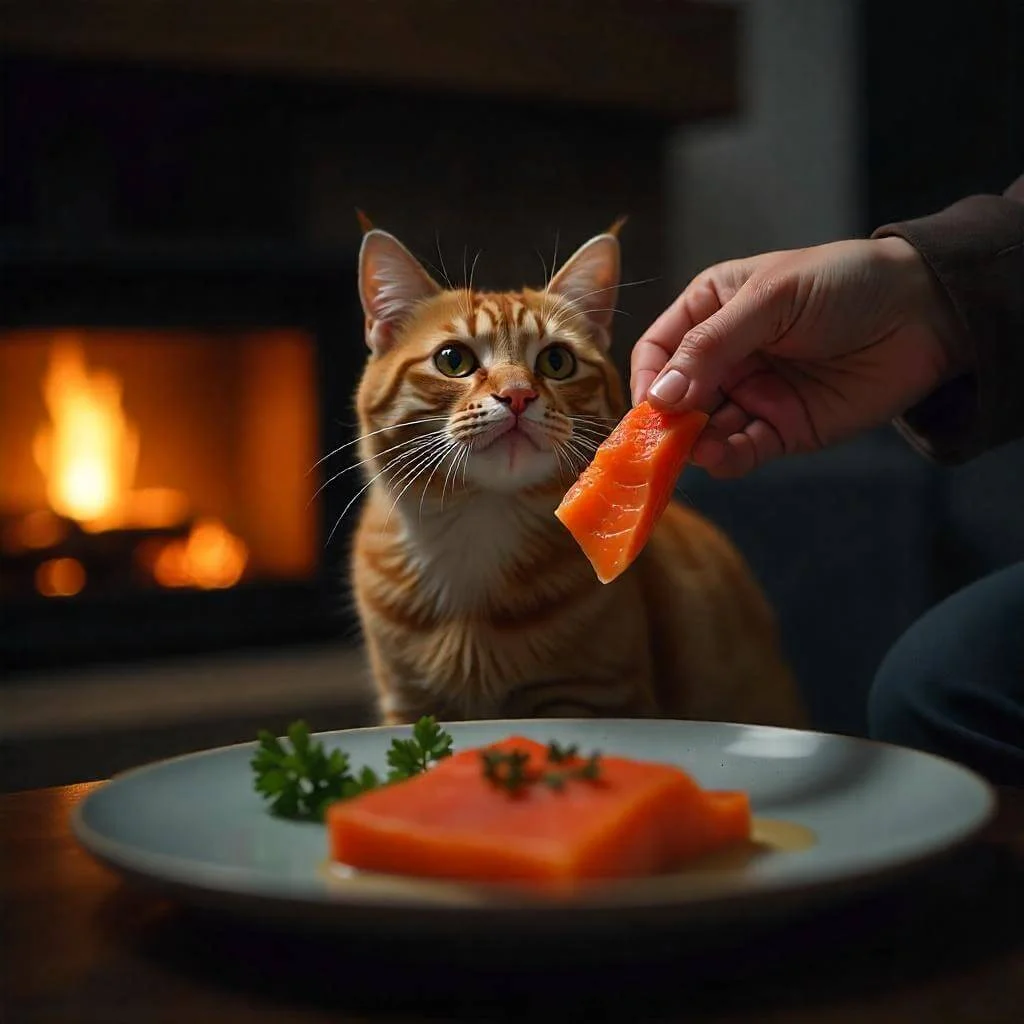
Omega-3 Fatty Acids Benefits
Smoked Salmon is full of omega-3 fatty acids. These fats make your cat’s skin and coat shiny. They also help with eye health, brain function, and heart health. Feeding salmon can keep your cat’s heart working well.
Vitamin B12 and B6 Importance
Smoked Salmon also has vitamin B12 and vitamin B6. Vitamin B12 is key for your cat’s nervous system and brain. Vitamin B6 helps with fat and protein breakdown, keeping your cat healthy.
Joint and Brain Health Support
Salmon’s anti-inflammatory properties are great for older cats or those with joint problems. It supports joint health and keeps your cat active. The omega-3s and vitamin B12 also boost brain function and cognitive support.
Adding salmon to your cat’s diet offers many health benefits. It can improve their coat, eyes, joint mobility, and brain health. Always check with your vet before making any changes to your cat’s feline diet benefits.
Can Cats Eat Smoked Salmon
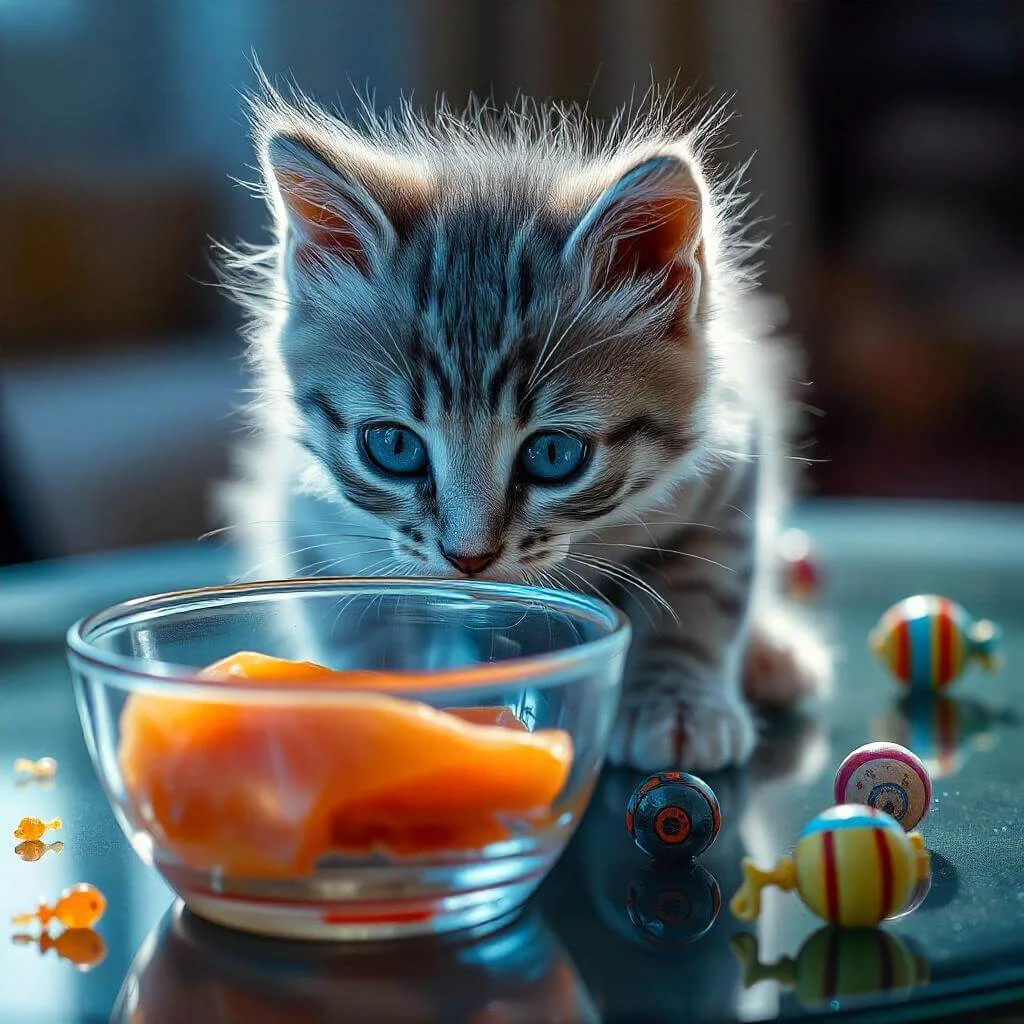
Smoked salmon might taste great to you, but it’s not good for your cat. Cats should not eat smoked fish, like salmon, because it has too much salt. Smoked salmon has 600 to 1,200 milligrams of salt per 100 grams, which is too much for cats.
Eating too much salt can harm your cat’s health. It can cause dehydration, upset the balance of electrolytes, and even damage the kidneys. Cats naturally don’t like salty tastes and can’t handle a lot of sodium.
“Cats should not be fed any type of smoked fish, including salmon, due to the high sodium content, which can be dangerous for their health,” advises Dr. Sarah Wooten, a veterinary expert.
While a little cooked, plain salmon is okay for cats sometimes, it’s best to avoid smoked salmon. Choose safe proteins for your cat and talk to your vet before adding new foods to their diet.
Safe Ways to Prepare Salmon for Your Cat
As a cat parent, you might want to share your salmon with your cat. But, it’s important to know how to prepare it safely.
Read this preparation guide for better results How to Prepare Smoked Salmon.
This way, you can give your cat the good stuff from salmon without any risks.
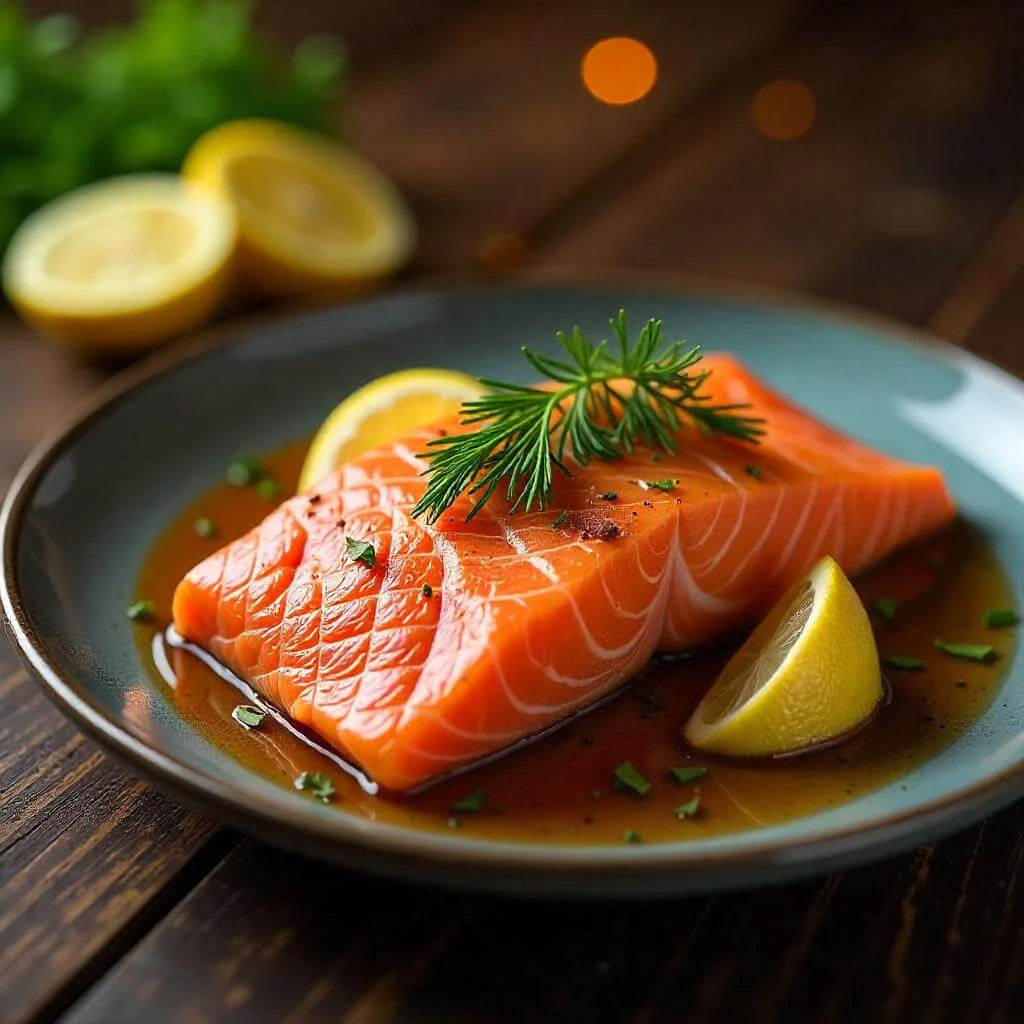
Proper Cooking Methods
When giving smoked salmon to your cat, make sure it’s fully cooked. Raw or undercooked salmon can have harmful parasites and bacteria. The best ways to cook salmon for your cat are baking, broiling, grilling, or pan-searing. Use no oils or butter.
Portion Control Guidelines
Salmon can be a healthy treat for your cat, but only in small amounts. Experts say salmon should not be more than 10-15% of your cat’s diet. Start with a small amount, like a pinch or two, and watch how your cat reacts.
By cooking salmon well and giving it in small amounts, you can give your cat the benefits of salmon. This ensures your cat stays healthy and happy.
Potential Risks and Dangers of Salmon Consumption

Smoked salmon can be good for cats, but there are risks. Cats might get cat food allergies from it. This can cause vomiting, diarrhea, or skin problems.
Also, fish toxicity in cats is a big worry, especially with raw salmon. Raw salmon can have harmful bacteria and parasites. Eating too much can lead to thiamine deficiency, which is very bad for cats.
- Choking hazard from salmon bones
- Potential for gastrointestinal issues like vomiting and diarrhea
- Risk of obesity from overfeeding salmon
- Possible vitamin K deficiency in kittens and nursing cats
- Potential link between fish-based diets and hyperthyroidism in cats
Watch how your cat reacts to salmon. If they seem sick, talk to your vet. This way, your cat can enjoy salmon safely.
Different Types of Salmon and Their Safety Levels
Not all salmon is safe for your cat. It’s important to know the different types and their safety levels. This ensures your cat stays healthy and happy.

Fresh vs Canned Salmon
Fresh, cooked salmon is the safest for cats. Cooking kills harmful bacteria or parasites in raw fish. Canned salmon in water can be a treat, but avoid ones with oils or high sodium.
Raw vs Cooked Options
Raw salmon is risky due to salmonella and parasites. Cooked salmon is safer because it kills harmful organisms. Cooked salmon skin is also safe in small amounts, but watch out for seasonings that might upset your cat’s stomach.
| Salmon Type | Safety Level for Cats | Recommended Preparation |
|---|---|---|
| Fresh Salmon | Safest | Cooked, without added seasonings or oils |
| Canned Salmon (in water) | Moderately Safe | Occasional treat, avoid versions with added oils or high sodium |
| Raw Salmon | Unsafe | Not recommended due to risk of bacterial infection and parasites |
| Cooked Salmon Skin | Moderately Safe | Safe in moderation, avoid added seasonings or spices |
Knowing the safety levels of different salmon types helps you choose wisely. Always remember to keep portions small and prepare it correctly. This way, you ensure your cat’s health and happiness.
Signs of Salmon Allergies in Cats
Feline food allergies, including those to salmon, can show in many ways. Common signs include itchy skin, scratching, sores, and hair loss. Your cat might also have stomach problems like vomiting and diarrhea.
It’s key to remember that allergies can pop up even if your cat has eaten a food before without issues. If you see these signs after adding salmon, see your vet right away. They can figure out if it’s an allergy or sensitivity and what to do next.
Tests like skin prick tests and blood tests for IgE antibodies can confirm an allergy. Your vet might suggest an elimination diet to find the exact cause. With the right care and diet, your cat can feel better and live a happy life.
Read More Helpful Articles Below :
How to Prepare Smoked Salmon: Easy Recipes and Serving Ideas
How Long Does Smoked Salmon Last – Storage Guide
Best Smoked Salmon on a Pellet Grill Made Easy
Easy Smoked Salmon and Philadelphia Cheese Recipe Ideas
Smoked Salmon and Cream Cheese: You Need to Try
FAQ
Can cats eat salmon?
Yes, cats can eat salmon, but it must be prepared right. Salmon is good for their coat, eyes, brain, and heart. It should be in fish-first cat foods, toppers, or treats. But, avoid raw, smoked, or seasoned salmon.
Why are cats drawn to salmon?
Cats love salmon because of its smell and protein. Salmon’s aroma and nutrients meet their carnivorous needs. This makes it very appealing to them.
What are the nutritional benefits of salmon for cats?
Salmon is full of Omega-3 fatty acids, which are key for cats. It also has vitamins B12 and B6, important for their immune and nervous systems. Salmon helps with skin, coat, and joint health, and is a top-notch protein source.
How does salmon benefit a cat’s health?
Salmon’s Omega-3s improve eye health and skin/coat condition. Vitamin B12 boosts brain function and supports the nervous system. Vitamin B6 helps with fat and protein use. Salmon also helps with joint health and supports the heart and immune system.
Can cats eat smoked salmon?
No, cats should not eat smoked salmon. It has too much salt, which is bad for them. High sodium can cause serious health issues. It’s best to keep cats away from smoked fish, including salmon.
How should I prepare salmon for my cat?
Cook salmon well to kill parasites and bacteria. Bake, broil, grill, or pan-sear it without oil or butter. Remove bones before serving. Give small amounts, like a pinch or two, as a treat. Salmon should not be more than 10-15% of a cat’s diet. Start with small amounts to check for allergies.
What are the risks of feeding salmon to cats?
Risks include allergic reactions, choking on bones, and parasites in raw fish. Too much can cause obesity. Raw salmon may have harmful bacteria like E. coli and salmonella. Some cats might get thiamine deficiency from eating too much raw fish. Watch for signs of illness like vomiting, diarrhea, or changes in behavior after eating salmon.
What types of salmon are safe for cats?
Fresh, cooked salmon is safest. Canned salmon in water is okay sometimes, but avoid versions with oils or high sodium. Raw salmon is risky due to bacteria and parasites. Cooked salmon skin is safe in small amounts. Avoid adding seasonings or harmful ingredients when preparing salmon for cats.
How do I know if my cat has a salmon allergy?
Signs of salmon allergies include itchy skin, scratching, sores, fur loss, vomiting, and diarrhea. Even if a cat has eaten salmon before, they can still develop an allergy. If symptoms appear, stop giving salmon and see a vet. Watch closely after introducing salmon for the first time.
